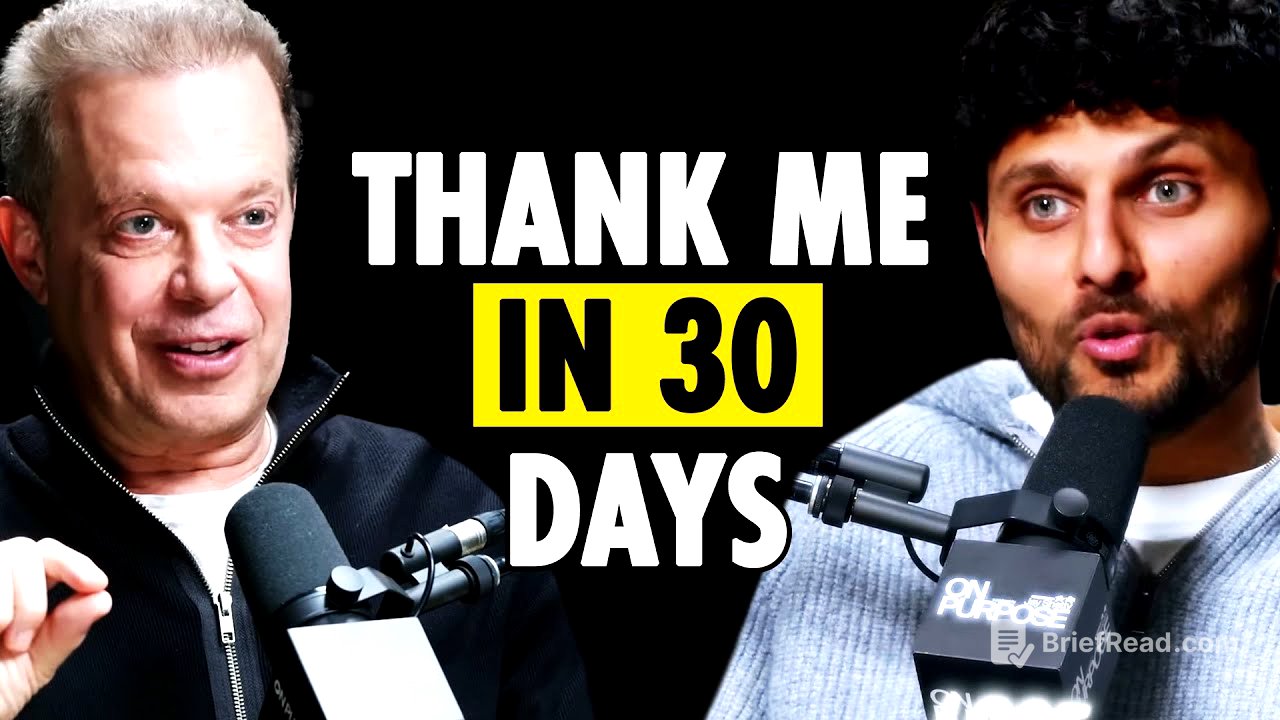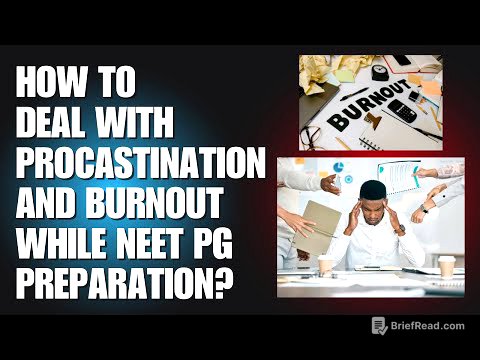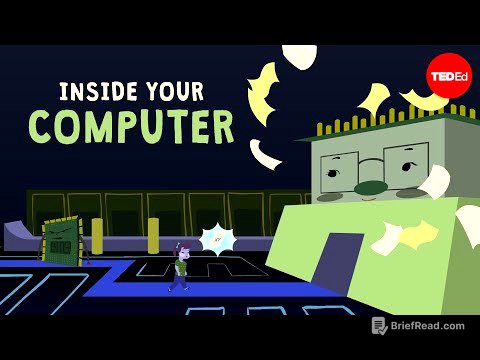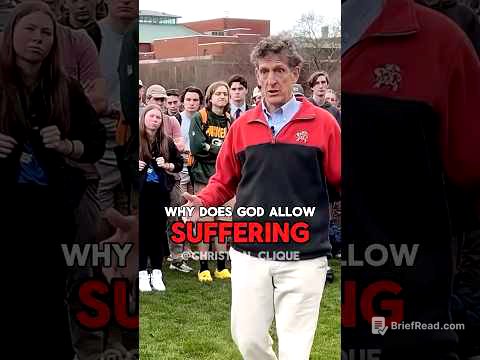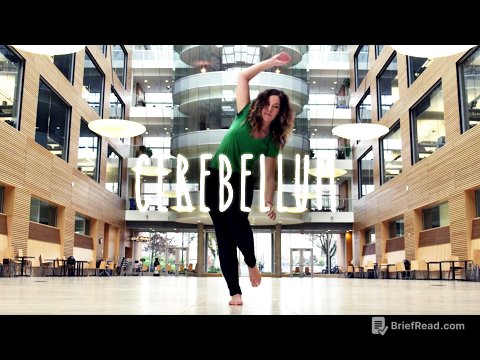TLDR;
This podcast episode features Dr. Joe Dispenza discussing the power of repetitive thoughts, becoming conscious of unconscious beliefs, and the science behind emotions and past experiences. He emphasizes the importance of meditation, breathwork, and community in transforming one's life. Key points include:
- Repetitive negative thoughts can hardwire the brain, leading to automatic and unconscious behaviors.
- Change requires becoming conscious of these unconscious thoughts and making different choices.
- Emotions are a record of the past, and reliving them keeps the body stuck in the past.
- Meditation and breathwork can help regulate brain waves, disconnect from the body and environment, and create new emotional states.
- Community and connection are essential for overcoming survival mode and fostering healing.
Intro [0:00]
The discussion begins with the idea that while repetitive thoughts can be powerful for creation, they can also be dangerous if they reinforce negative beliefs. Many people have daily thoughts of being unlovable or unworthy. The key is to become conscious of these unconscious thoughts, as they drive choices, behaviors, experiences, and emotions, ultimately shaping biology and gene expression.
How do you become conscious of your unconscious self? [3:33]
Change involves confronting uncomfortable, unconscious beliefs. The body craves familiar emotional states, so inhibiting negative thoughts leads to biological cravings. Overcoming this requires a conscious decision to confront these thoughts and make different choices, even when it feels unfamiliar. The brain seeks evidence of change in the environment, and if it doesn't find it, people often revert to old patterns. True change happens when one becomes so conscious of unconscious thoughts that they never go unconscious again, reconditioning the body to a new mind.
“Where you place your attention is where you place your energy.” [15:22]
The discussion highlights the importance of intention and attention in rewiring the brain. By consciously choosing thoughts and rehearsing desired behaviors, one can install new circuits in the brain. The brain doesn't differentiate between real and imagined experiences, so mental rehearsal can prepare the brain for future situations. Generating elevated emotions like worthiness and gratitude can condition the body to believe it's living in a new future, signaling genes ahead of the environment.
The science behind why our emotions are making us relive past experiences [21:30]
Feelings and emotions are the end product of past experiences, and the stronger the emotion, the more altered we are. Every time we remember a traumatic event, we produce the same chemistry in the brain and body as if it were happening again, conditioning the body to live in the past. To reprogram the brain, one must regulate brain waves, slowing them down from the analytical beta state to the more imaginative alpha state, opening the door between the conscious and subconscious mind.
The 3 important elements in your life that you should focus on when you’re stressed [26:09]
Stress and survival mode limit attention to the body, environment, and time, making it difficult to be present. To change, one must get beyond these elements and sink into the present moment. This requires tools and skills to take attention off stressors and settle the body. By consistently bringing the body back to the present, one can liberate energy and transmute limited emotions into elevated ones, leading to feelings of love and gratitude.
What is meditation and can you start practicing it? [35:47]
Meditation is defined as becoming familiar with both the old and new self. The goal is to stay present and feel a desired emotion, conditioning the body to believe it's living in a new life. Consistent practice, even for seven days, can lead to significant metabolic and biological changes. New knowledge and information cause one to think differently, leading to different choices, behaviors, and experiences, reinforcing the process of change.
How our emotions can convince our body to change significantly [40:21]
The discussion emphasizes that people often rely on external factors to regulate their emotional state, leading to dependence. It's crucial to teach people that they can regulate and change their emotional states internally. Change is an ongoing process, and the more one changes, the more evidence they should see in their life. A values crisis is often a habits crisis, as people struggle to reprogram their habits and assume their feelings define them.
How does breathwork impact our heart rate variability? [45:34]
Stress causes the brain to fire incoherently, diminishing energy in the brain and heart. By broadening focus and sensing nothing, the brain starts to synchronize, becoming more orderly. Resting attention in the heart and regulating breath, even for one minute, can change brain waves and heart function. Coherence in the brain and heart allows one to feel the emotions of their future before it happens, broadcasting a new signal into the field.
What happens when you get emotionally stuck in the past? [52:21]
Living in emergency mode for extended periods is addictive and leaves no energy for growth and repair. When faced with problems, one has a choice: be victimized by conditions or be a creator. It's essential to recognize when in an altered state and avoid making decisions from that state. Practicing relaxation and regaining composure allows one to address situations from a different, more empowered state.
“What is it about me that I still have to change in order to heal?” [1:01:45]
Many people experience initial improvements in health conditions but don't fully heal because they spend most of their day back in old patterns. The key is to rehearse for life, consciously choosing how to act and feel in specific situations. Understanding that emotions signal genes ahead of the environment motivates one to stay in elevated states. Emotional balance is crucial, as constant stress can negate the benefits of diet and exercise.
The difference between meditation with and without breathwork [1:08:21]
Different types of breathwork serve different purposes. One technique involves pulling energy from the body up into the brain, promoting coherence and consciousness. Another involves forced inhalation and exhalation to induce euphoria and facilitate mystical experiences. These techniques are taught in online courses and live events, providing tools for personal transformation.
The basic practices to help build a community for our survival [1:11:32]
Research shows that collective coherence can influence random events, demonstrating the power of community. Humans are wired to give, connect, and care for one another. Community fosters courage, compassion, and love, especially in times of fear and pain. When individuals work on themselves and are okay with themselves, they can be okay with everyone, creating a healthy model for the world.
